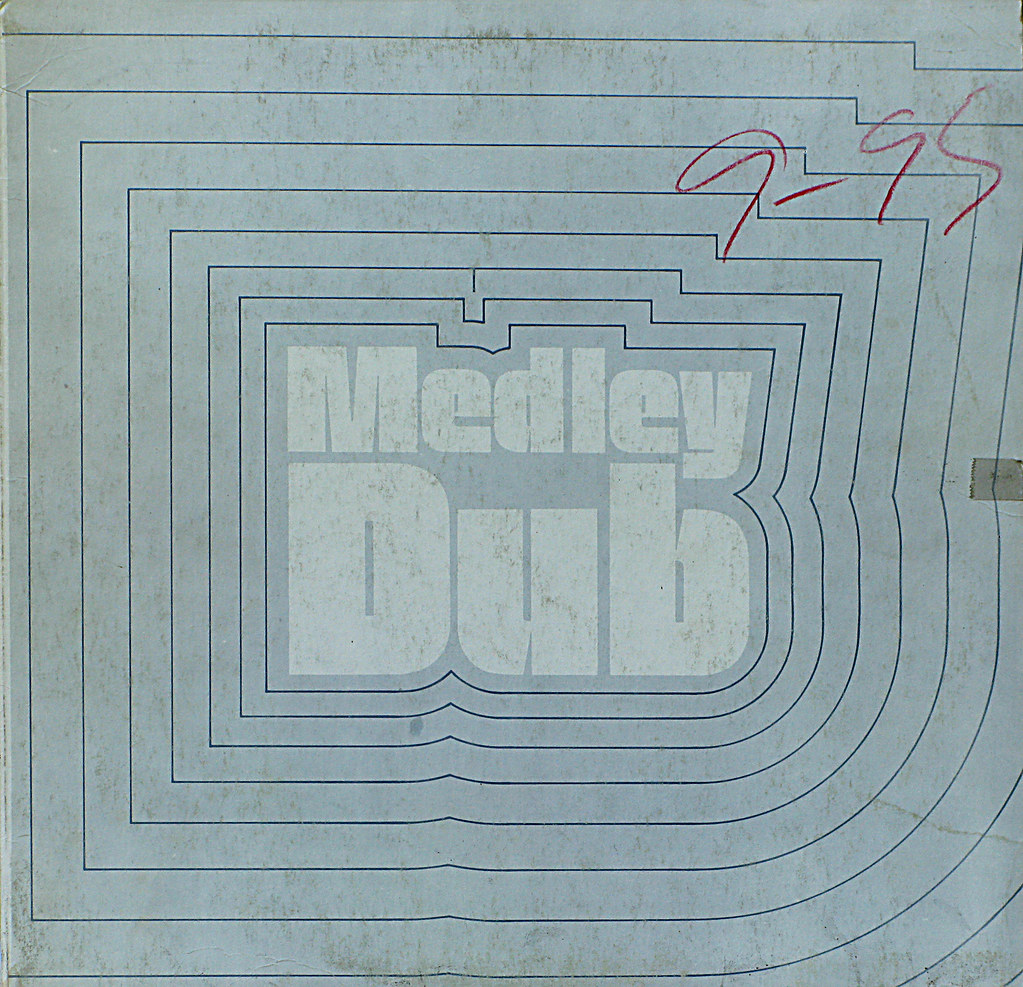
Not so long ago, an acquaintance was curious as to my stance regarding drugs. The response was immediate and truthful: I own many dub albums. Several posts within No Condition Is Permanent come with recommendations for cocktails appropriate to the sounds at hand; with today’s post, I can only hone my flair for the obvious: Herbalizers, start your vaporizers!
Yes, herb and herb alone will provide the change of mind best matched to today’s offering, Medley Dub. The album embodies the allure of dub, Jamaica’s contribution to electronic music. As is common knowledge by now, dub was born in Kingston's studios. There, recording engineers deconstructed the multi-track tapes of songs, playing mixing board faders as one might play a piano's keys. The singer's track would be dialed out, so that DJ's could 'toast' atop rhythms embellished with splashes of reverb and runaway tape echo, effects borrowed from Ennio Morricone's scores for spaghetti westerns, these films being fantastically popular in Jamaica. (The English music historian and theorist David Toop, ever wise, once described Morricone as 'a straight line drawn between Puccini and dub reggae.')
Medley Dub exemplifies this form early in its evolution. In these re-imagined 'versions,' non-sequiturs gallop out of the shadows, only to fade seconds later; imagine a reggae band performing on the far bank of the river Styx, its vocalist occasionally struck by lightning. George Melly’s description of '60s psychedelic music (from his essential Revolt Into Style) serves dub equally well: "Objects appear and disappear, metamorphosis becomes a commonplace." The songs have been stolen out from under their singers. Only apparitions remain, shadowy voices drifting through the studio reverb unit, the sound of fata morgana. Bass and drums rule the dance to seismic effect. Logic becomes immaterial, just so much smoke in the grooves of hastily pressed vinyl.
I was one lucky college student. My initial exposure to dub, and to Jamaican music in general, occurred in the living room of Martin Walsh, film professor, armchair Marxist, hedonist without constraint and an unapologetic skirt-chaser. (My first experience of psychedelics took place in Walsh’s front room, too, recalled in my “Epiphany” essay for the U.K. periodical, The Wire.) Walsh, an Englishman, had recently moved to Canada. Jamaican sounds were already well established in his menu of rococo appetites. The Walsh collection was well-stocked with lp sleeves whose crude two-color printing exuded rude magnetism: the Twinkle Brothers Rasta Pon Top, Culture’s Two Sevens Clash, Prince Far I’s Psalms For I. Best of all, he thought Bob Marley was dull. (Curiously, Martin adored Springsteen and Mary Hartman, Mary Hartman. Go figure.)
Prof. Walsh was my ticket in. Early on in our acquaintance, he put Augustus Pablo’s King Tubbys Meets The Rockers Uptown on the turntable. Immediately, I witnessed a mere 12" vinyl disc threaten the structural integrity of his Victorian house. I sat very still, impressed into silence. It was as though I had discovered moving pictures by bumbling into a screening of Citizen Kane in time for the establishing shots of Xanadu.
I wasn’t able to score my own copy of King Tubbys… immediately. My professor took me along on shopping trips to Toronto’s Caribbean ghettos in search of rootical vinyl. There we would stroll past sullen black women seated beneath hair dryers; the best albums were found in the back of Monica’s, a beauty parlor on Eglinton. Medley Dub was my first purchase on one such foray. The cover was sealed with tape that had stained its cardboard. The price was inscribed on the sleeve with scarlet grease pencil. There was next to no information at all beyond the track titles and an engineering credit. Already worn-looking and smelling of permanent solution, the record promised dark stuff. I had the goods in hand, all I had to do was buy the thing. Needless to add, Medley Dub delivered in spades.
In his excellent notes for the Musical Feast compilation, Heartbeat label proprietor Chris Wilson offers a respectful depiction of Sonia Pottinger, the producer whose High Note imprint originally issued Medley Dub. Her productions, in his words, “…were characterized by a thoughtfulness, and a certain innocence.” (Wilson refers to the producer as ‘Mrs. Pottinger’ throughout, even in the subtitle of his compilation. Manners and respect will always carry the day here at NCIP.) That innocence was balanced by the Mephistophelian touch of engineer Errol Brown. His many early dub releases include the Treasure Isle In Dub series and, alongside those of King Tubby (a deity who walked among us as a man, at least until he was shot in his front yard), helped to define dub in its nascent years during the early '70s.
Errol Brown’s dub mixes make a good case for the position, still held by many a dub aficionado, that great dubs can only be fashioned from four-track master tapes. Even so, Brown manages to isolate fragments of the music at critical junctures, summoning drama, mystery and even comedy when least expected. Hearing the brass section solo’ed as the players tied into the central riff from “Lazy, Crazy, Hazy Days of Summer” must have had dancers in Kingston’s yards smiling in spite of the humidity. Soon enough, dub would enter its surrealist/dadaist phase, where doorbells and test tones and cuckoo clocks accessorized the mixes compiled within Joe Gibbs’ African Dub series or the much-chronicled mid-‘70s output of Lee Perry’s Black Ark studio. Medley Dub was the acme of an earlier moment, when the spry rhythms of rock steady had yet to slow down; the transition to the gravitas of ‘70s cultural reggae rhythms had begun. As you will hear, the dark stuff was already seeping in.
Medley Dub @ 160
Comments
As Elephantman may say, Shizzle my nizzle! Dub is definitely more up my alley. Already in the itunes.
Wing